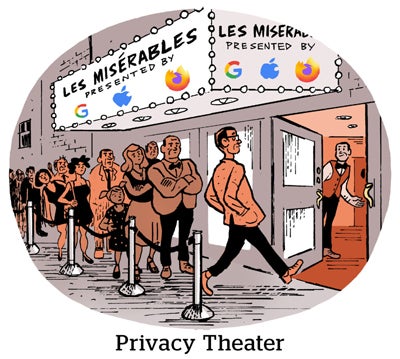Google’s Topics API was, well, a very hot topic last week.
Ad tech companies and publishers jumped all over the proposal after it was announced, many with critical takes on the kinks that need to be worked out.
The Topics API is already “take two” for Google. The proposal, which is the latest addition to the Privacy Sandbox, replaces Google’s FLoC (Federated Learning of Cohorts) API after it stalled over privacy concerns. A great irony, since the purported purpose of the Privacy Sandbox is to develop privacy-protective alternatives to third-party cookies.
But it became clear during developer testing of FLoC last year that the approach had the potential to actually enable fingerprinting, and also didn’t put any safeguards in place to prevent sensitive category targeting.
These deficiencies led Google to scrap FLoC and introduce Topics as its proposed answer to interest-based advertising in the eventual absence of third-party cookies in Chrome.
The question, though, is whether the Topics API – which aims to let advertisers target based on a very limited number of broad content topics as determined by the browser – will be effective for advertisers.
The jury’s still out on that one.
Broadly speaking
One of the main concerns bubbling up among ad tech folks is that the categories returned by the Topics API for targeting will be too broad to be useful for a marketer’s purposes.
To start, there will only be around 350 topics in the API’s taxonomy, which isn’t a heck of a lot, and they’re broadly defined, with categories such as travel, sports, books, auto, music and fitness.
In theory, someone in the market for a pole vault could be in the same segment as an NHL fan.
“And if every sports marketer in the world is using the sports topic, it’s hard to imagine that’s going to provide good results relative to what they can do today,” said Joshua Koran, EVP of data and policy at Criteo.
Then again, the move from FLoCs to Topics “may be desirable to advertisers,” said Ian Trider, VP of RTB platform operations at Basis Technologies.
FLoCs were “opaque, arbitrary groups of people with no specific human-identifiable meaning,” which required the use of machine learning or other approaches to identify which FLoCs were relevant to use for targeting, Trider said. “Topics are a human-friendly taxonomy of easy-to-understand categories like ‘movies’ or ‘insurance.’”
Still, 350 categories is hardly enough to support the sort of granular targeting marketers are used to … although it’s not as if the status quo is all that amazing, said Paul Bannister, chief strategy officer at CafeMedia.
“Topics really only needs to be better than today’s third-party data segments, which are also pretty bad, so maybe enough can be derived from this system to be useful,” Bannister said. “We’re really interested to see what goes on in the origin trials when they start.”
The “devil will be in the details,” said Sheri Bachstein, GM of IBM Watson Advertising and CEO of The Weather Company.
“On the surface, Topics seems to most closely reflect contextual advertising, which has been around for some time,” Bachstein said. “While that approach has value, the marketing and advertising industry is looking for more innovation.”
Another potential issue with the Topics API has to do with real-time feedback or, more precisely, the lack thereof. As they spend their media dollars, marketers need to know what’s working and what isn’t as quickly as possible, so they can optimize and avoid wasting budget, Koran said.
“The short summary is that the Topics API is not designed to be effective,” he said, “and in large part that’s because it’s not designed with any feedback mechanisms.”
Performance marketers will be “left scratching their heads” when they try to optimize spend and measure results with Topics, said Travis Cameron, VP of strategic partnerships for the Americas at Tealium.
This might result in marketers moving their spend away from programmatic in areas where the only data available is Topics data and toward direct deals with a focus on first-party data and second-party data sharing in clean rooms, Cameron said.
Frequency cracked
And then there’s the question of what happens with frequency capping when third-party cookies are no more, which isn’t getting enough attention.
To be fair, frequency capping would have been an issue with FLoC as well. If Topics and, more generally, a lack of cookies break frequency capping, “that’s kind of a problem,” said Eric Schmitt, a research director at Gartner.
“A cornerstone value prop of independent ad tech is the ability to manage frequency and, to some degree, reach across platforms … [but] if that capability isn’t there, it would seem to further fuel the trend towards direct-to-platform – Google, Facebook, Amazon – and direct-to-publisher media-buying arrangements,” Schmitt said. “File this under: further musings on the cookie-pocolypse.”
(There is a proposal in the Privacy Sandbox called “Exchange-Enforced Frequency Capping,” but, like most everything else in there, it’s just a high-level outline for an idea that, for now, lives largely unnoticed on GitHub.)
The competish sitch
And finally, as always with a behemoth like Google, there is the question of competition – or, rather, anticompetition.
With the Topics API, the browser (in this case, Chrome) monitors what pages a person visits and uses “a magic algorithm” to assign topics of interest, Koran said.
“For one, Google reserves the right to change the algorithm that assigns the topics, so it’s not consistent,” he said. “And the second issue is exclusivity, which is the exact same issue as anticompetition, because how come Google is the only company in the world that gets to assign audience interests? Why is there not a competitive market to generate segments for B2B advertising based on third-party specs?”
Then again, all of the sturm und drang around the Privacy Sandbox “is all arguably a sideshow, since it only applies to in-browser ad formats,” Schmitt said. “Hardly the largest or highest-growth ad segments.”
“Other large and high-growth media segments, like search, streaming TV – YouTube – in-app social and gaming may actually become more valuable” as a result of phasing out third-party cookies, said Schmitt, who noted that it also seems unlikely that these privacy changes will have much impact on Google custom audience lists, look-alike models, retargeting and other capabilities in DV360, Ads Data Hub or Google Analytics.
It’s hard not to be cynical.
As Gartner’s Schmitt summed it up: “What a coincidence.”
















